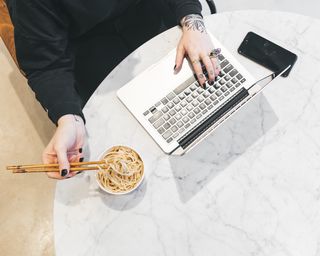Productivity
The Pandemic Is Not a Productivity Contest
Practice self-compassion and achieve balance in times of crisis.
Posted June 8, 2020

Pre-pandemic routines have been uprooted for most Americans. Many are trying to hold on to some semblance of normalcy as they are confined to their homes, which has highlighted different styles of coping with the upheaval of everyday life. Many are trying to seize the day by viewing quarantine as their chance to explore new hobbies or accomplish tasks they previously did not have the time to complete. This is a common response to uncertainty and can even be a positive way of coping with stress, for some. But going so far as to treat this time of self-quarantine as a productivity contest can have devastating consequences for others.
American culture is both highly socialized and fast-paced, creating an always-on mentality. This leaves people searching for their next great project to fill them with a deeper sense of purpose or distract themselves from feelings of loneliness or fear.
Many already held the belief that they should make every day count by checking off each item on their never-ending to-do list. This tendency seems to have amplified under quarantine, as more time at home means more opportunities to be productive. But simply being productive is not enough for those who have taken this idea to the extreme.
Take a look at social media and you’ll find people who are working towards becoming the next best chef, author, athlete, or musician during the lockdown. Ambition is important, but often we need to draw a line. No one should feel pressured to write the next King Lear, as Shakespeare did while he was quarantined during the bubonic plague.
As a clinician in the addiction treatment field, I always encourage healthy goal-setting. People with substance use and mental health disorders are prone to negative self-talk and can certainly benefit from the confidence boost that comes from seeing tasks to completion or immersing themselves in new hobbies.
It is critical to focus on creating goals, which are specific, measurable, attainable, relevant, and time-based. If these attributes are not taken into consideration, we are likely setting ourselves up for failure or disappointment, either by not giving ourselves enough time or creating goals that are too lofty to realistically be carried out.
When a person’s sense of self-worth is so closely tied to their ability to drive results, their health and wellness can become compromised. Well-being has to be top of mind during a global pandemic, when anxiety is running high and additional stress can compromise the immune system, making us more susceptible to illness.
A major stressor that is driving people to overachieve is the perceived loss of control during COVID-19. According to a survey of 5,000 Americans conducted by ThriveGlobal, approximately 75 percent of participants reported experiencing a severe lack of personal agency during the pandemic. In response, many will carry out repetitive tasks, such as cooking or cleaning, to divert their attention from the original source of stress.
Distractions are welcome sometimes, but we can’t allow ourselves to fall into a pit of productivity guilt, letting our sense of self hinge on whether we complete all of the projects we have been putting off for years. In fact, a 2019 journal study in Hypothesis and Theory found a correlation between workaholism and depression, since focusing on “issues” that need resolving can perpetuate negative thought patterns.
We have to maintain perspective and remind ourselves that we are experiencing an emotionally taxing, once-in-a-lifetime event. From concerns about personal safety to anxiety about the health of family members and friends to financial worries, now is not the time to place undue additional stress on ourselves.
Under the circumstances, our best may not be the same as it was prior to the coronavirus outbreak, but our best is good enough.
It’s OK to sleep in some mornings. And people should practice self-compassion; for many, it’s the only way to maintain mental wellness during these challenging times. Unless you feel particularly passionate about seeing a goal to fruition and doing so brings you genuine joy, don’t feel pressured to take on new home improvement projects or try every recipe in your cookbook.
Sometimes, making the choice not to produce results is the most productive action a person can take.


